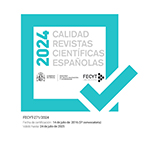Religiosidad popular y pluralismo ideológico. Significaciones religiosas y políticas en torno a la Semana Santa de Huelva
Résumé
En este artículo se analiza la relación entre el proceso de laicización o secularización de lo religioso y el crecimiento de los rituales de religiosidad popular en el contexto de las sociedades modernas contemporáneas a partir de un análisis etnográfico del ritual de la Semana Santa de la ciudad de Huelva. Haciendo uso de una metodología etnográfica de corte cualitativo, imbricada con técnicas de investigación cuantitativas de carácter sociológico, ponemos sobre análisis las significaciones religiosas e ideológico políticas de actores que participan y producen este ritual religioso popular, en atención a la diversidad y el pluralismo de ideas que se ponen en juego en torno a la Semana Santa y a la relativización de valores, creencias y prácticas que la hace posible. Asimismo, se analizan las características antropocéntricas y antropomórficas que permean el ritual y la relación colectiva con los iconos religiosos.
Téléchargements
##submission.format##
Licence
La revista 'Ilu. Revista de Ciencias de las Religiones, para fomentar el intercambio global del conocimiento, facilita el acceso sin restricciones a sus contenidos desde el momento de su publicación en la presente edición electrónica, y por eso es una revista de acceso abierto. Los originales publicados en esta revista son propiedad de la Universidad Complutense de Madrid y es obligatorio citar su procedencia en cualquier reproducción total o parcial. Todos los contenidos se distribuyen bajo una licencia de uso y distribución Creative Commons Reconocimiento 4.0 (CC BY 4.0). Esta circunstancia ha de hacerse constar expresamente de esta forma cuando sea necesario. Puede consultar la versión informativa y el texto legal de la licencia.











